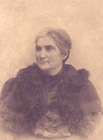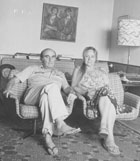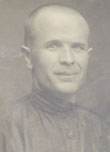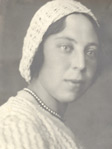

My great grandfather, David Iosifovich Agranovsky, and great grandmother, Sofia lived in the small town of Mena in the Sosnetskii district of Tchernigov province. They had five children. The family later moved to Warsaw in the early 1900s and then to Khar’kov.
The youngest in the family, Abram Davidovich Agranovsky, was born in 1896. He fought in the First World War and was wounded. He graduated from the medical institute in Khar’kov. During the Civil War he was: commissar of a field hospital, commissar of the medical section of the 12th army, and inspector of the Main Military Sanitation Administration of the Red Army. From 1930 to 1937, he served as a correspondent for the newspapers IZVESTIYA and PRAVDA. He married Fanya Abramovna Rappoport from Khar’kov who bore him two sons, Anatolii and Valerii. In 1937, Abram was arrested 1. Soon, so was my grandmother. They returned to Moscow in 1946. Abram continued to work in journalism. He died on June 17, 1951 while on assignment in the village of Bol’shoe Balandino in the Urals.
Anatolii Abramovich Agranovskii was born on March 8, 1922 (died, April 14, 1984). After the arrest of their parents, their aunt, Gisya Eterman, took guardianship of the two brothers. Fifteen-year-old Anatolii found work designing and painting cinema posters. He graduated in history from the Moscow State Pedagogical Institute in 1943, was drafted into the military and during the war completed a course of study at a military academy with a specialty as a navigator of bomber aircraft in 1946. After the war, he became a journalist and worked for many years as a correspondent with IZVESTIYA. He wrote romances and other songs for the verse of poets such as Akhmatova, Tsvetaeva, Pasternak, Tarkovsky, Samoilov, Slutsky, Kedrin, Mezhirov, Goff, and Sobol’.

The great grandfather of my granddad on my mother’s side, Vasilii Vasyunin, was an enserfed peasant in the village of Ivanovichi in the Dyad’kovskii district of Bryansk province2.
Great, great grandfather Afanasii Vasilievich and great grandfather Georgii (Egor) Afanasievich were also listed as Vasyunins. “Kamanin” was their family sobriquet (in the local dialect, the verb “kamanit’” meant to talk smoothly, or to tell stories). Egor Afanasievich worked in summer as a mason, and in winter as a woodcutter in the forest. They lived along with great grandmother Anna (Ganna) Matveena and 13 children.

 Fedor Georgievich Kamanin (Vasyunin), the oldest in the family, was born on March 1, 1897 (died, December 21, 1979). In 1916 he was drafted into the army and served in Yaroslavl in an infantry supply regiment. After the February Revolution (1917), he completed a course for rural teachers and taught in Ivanovichi. He moved to Moscow in 1922 and studied at the Higher Literature Institute. His first stories and tales — published under the name “Kamanin” — first appeared in 1924. He married Vera Mikhailovna Mikhailova3, who bore him two children, Galina and Victor. He was arrested in 1937 and spent 13 months in a prison in Orel. At the beginning of the war, he lived with his family in nearby Dyad’kov, and worked for an antifascist newspaper. From 1942 to 1945, grandfather and family were held captive in Germany. After the war, grandfather and grandmother lived in the village of Bryn’kovo in the Ruzskii district.
Fedor Georgievich Kamanin (Vasyunin), the oldest in the family, was born on March 1, 1897 (died, December 21, 1979). In 1916 he was drafted into the army and served in Yaroslavl in an infantry supply regiment. After the February Revolution (1917), he completed a course for rural teachers and taught in Ivanovichi. He moved to Moscow in 1922 and studied at the Higher Literature Institute. His first stories and tales — published under the name “Kamanin” — first appeared in 1924. He married Vera Mikhailovna Mikhailova3, who bore him two children, Galina and Victor. He was arrested in 1937 and spent 13 months in a prison in Orel. At the beginning of the war, he lived with his family in nearby Dyad’kov, and worked for an antifascist newspaper. From 1942 to 1945, grandfather and family were held captive in Germany. After the war, grandfather and grandmother lived in the village of Bryn’kovo in the Ruzskii district.

Galina Fedorovna Agranovskaya (Kamanina), my mother, was born in Moscow on May 5, 1928. After returning from captivity in Germany, she worked for a while and then married. She gave birth to my brother and me. She wrote a series of reminiscences about friends and relatives that became the basis for a book of memoirs, PRISTRASTNOST' ("Partiality"), that was published in 2003.
1He was sentenced to 10 years for participation in a “counterrevolutionary, Trotskyist organization”. He did not acknowledge guilt. He served a term in the Norilsk camp (2 l/o, barracks no. 14). Together with E. Drabkina and A. Mil’chakov, he organized a secret circle for the study of Marxism-Leninism. Later he was reassigned to work in the medical division of the camp. “For distinguished work in the camp, I ask permission to leave for doctor Agranovsky a quilted jacket of the first term in connection with his departure from the camp” (from a report of the head of the sanitation department of the Norilsk camp, 12 September 1941). In October 1941, he was transported to Krasnoyarsk for secondary investigation of his case. He sat for 8 months in isolation at the local NKVD’s underground prison before being freed on 3 July 1942.
2According to family legend, much like a fairytale, Vasilii possessed unbelievable strength — he once killed a bear with a blow of his fist to its ear, and, another time, he ripped a tree from the earth in order to reach a marten.
3Grandma Vera’s parents were Mikhail Mikhailovich and Maria Petrovna Mikhailovs.